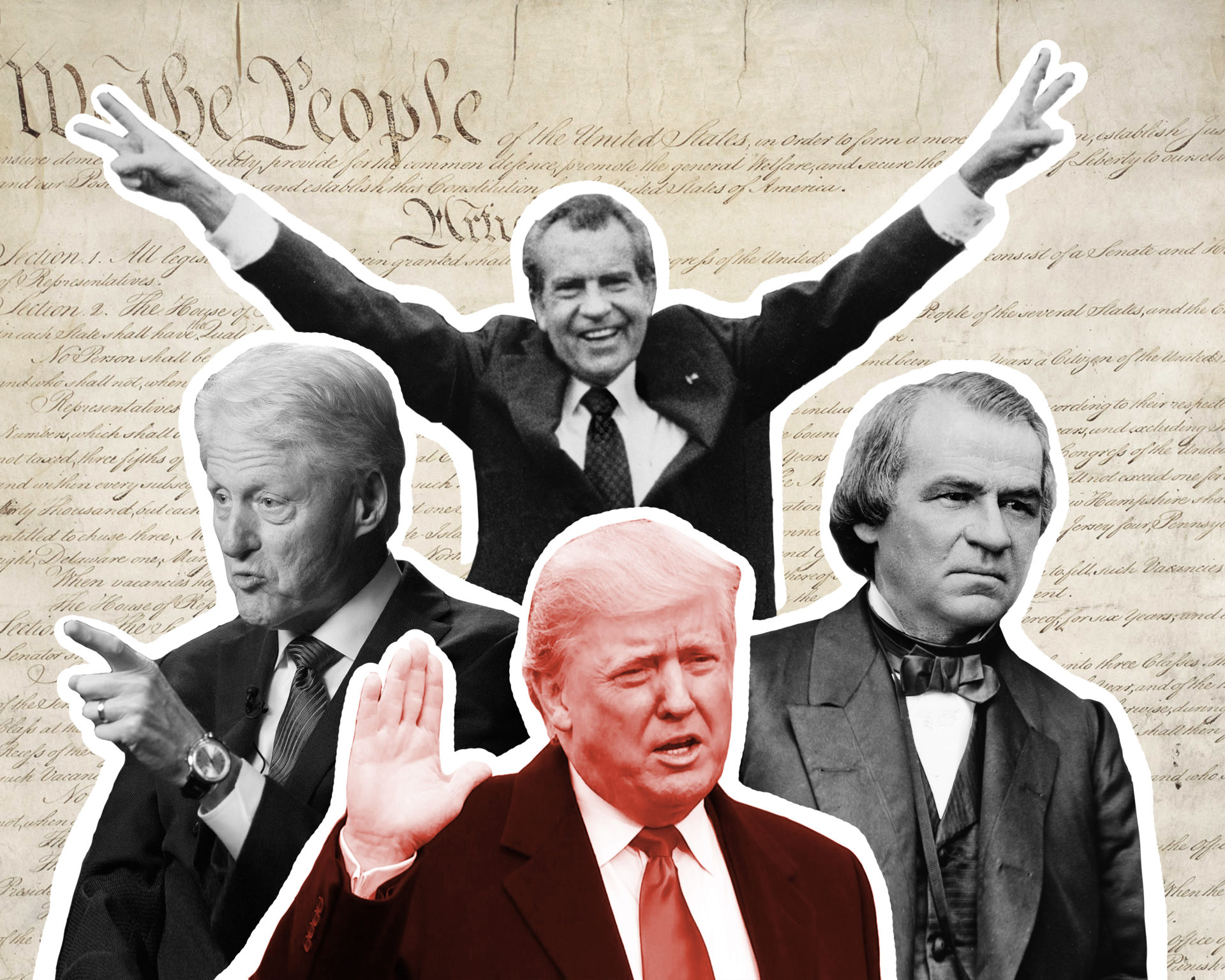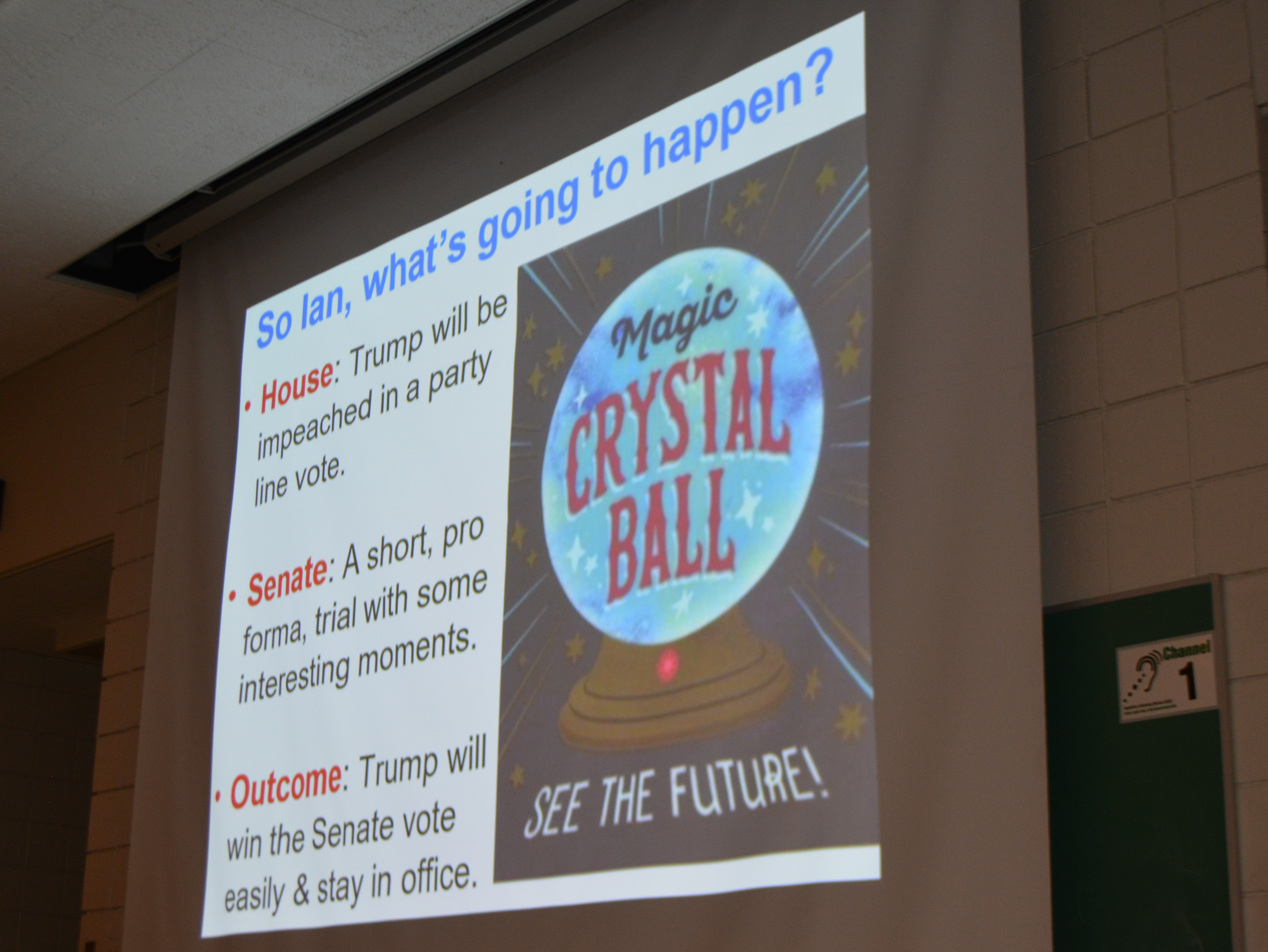Five Things You Need to Know About the Impeachment Process
December 4, 2019 - Karessa Weir
In the inaugural Five Things to Know lecture series, Political Science assistant professor Ian Ostrander boiled down all the chatter about the ongoing impeachment of President Donald J. Trump into five important points about the little-understood process of presidential impeachment.
No. 1: There is No Process.
Dr. Ostrander focused on the process of the impeachment rather than the facts before the House of Representatives because it has been so rarely used against presidents that, in fact, there is no process. That’s the first thing you need to know.
“The Constitution was vague on this one, with only broad procedures, so basically each chamber chooses its own rules,” Dr. Ostrander said. “We can’t just consider the Constitution but also the precedents which have been few and far between.”
 Only three presidents before Trump were subjected to impeachment. Andrew Johnson was the first president to be impeached but was not removed from office . Richard Nixon was about to be impeachment but resigned before the process was complete. Bill Clinton’s impeachment passed the House of Representatives but he was acquitted during the trial in the U.S. Senate.
Only three presidents before Trump were subjected to impeachment. Andrew Johnson was the first president to be impeached but was not removed from office . Richard Nixon was about to be impeachment but resigned before the process was complete. Bill Clinton’s impeachment passed the House of Representatives but he was acquitted during the trial in the U.S. Senate.
“Keep in mind that there is little precedent and that each chamber makes up it’s own rules,” Dr. Ostrander said.
No. 2: Each Chamber Has a Key Role
The House of Representatives starts the impeachment inquiry and gathers evidence. They then vote on articles of impeachment – this is “being impeached,” Dr. Ostrander said. The House can impeach the president with a simple majority of votes.
 The Senate hosts the trial of the president and, if they vote to convict, they decide the degree of punishment up to and including removal from office and barring him from future office holding. To convict, the Senate needs a “super majority” of 67 out of 100 votes. This means at least 20 Republican Senators would need to vote in favor of conviction for Trump to be removed from office. The Senate trial is overseen by Supreme Court Chief Justice John Roberts.
The Senate hosts the trial of the president and, if they vote to convict, they decide the degree of punishment up to and including removal from office and barring him from future office holding. To convict, the Senate needs a “super majority” of 67 out of 100 votes. This means at least 20 Republican Senators would need to vote in favor of conviction for Trump to be removed from office. The Senate trial is overseen by Supreme Court Chief Justice John Roberts.
No. 3: Impeachment Adds Power to House Oversight
The impeachment process automatically gives the House majority stronger investigative powers and extra influence in the courts. This means the House can use the impeachment powers to investigate matters not directly related to Ukraine, Dr. Ostrander said.
This is also a reason why the Democrats may want to keep the process in the House – to give them more time to investigate any other possibly impeachable offenses.
No. 4: Many Articles of Impeachment Can be Considered Independently
It is up to the Judiciary Committee of the House to decide the actual articles of impeachment and currently they are considering whether these should be broadly written or narrow to a single issue. They could issue articles that encompass abuse of power, obstruction of justice in the Ukraine investigation, and even obstruction of justice relating to the Mueller report, he said.
 “So far we are seeing them going with narrow articles but they could certainly broaden them at any time,” Dr. Ostrander said.
“So far we are seeing them going with narrow articles but they could certainly broaden them at any time,” Dr. Ostrander said.
Once the committee issues the articles, the House can vote on each article independently. They do not need to be bundled together. This gives the Democrats flexibility to appeal to both the liberal and moderate wings of the party, given them each an acceptable option to support.
No. 5: The Senate Trial is Political
Senate Majority Leader Mitch McConnell, a Republican, will set the agenda and the schedule. Chief Justice Roberts will preside but a simple majority vote can overrule him on process. There is no standard of evidence for convicting the president.
“No crime necessarily needs to be committed or proven to justify removal from office. This is not a criminal proceeding. He could be removed simply for ‘abuse of office’,” Dr. Ostrander said.
 After explaining the process, Dr. Ostrander pulled out his crystal ball and gave his best prediction of how the impeachment will play out. He expects the House to impeach Trump on a party-line vote. The Senate will hold a “short, pro forma trial with some interesting moments.” In the end, he expects Trump to win the Senate vote easily and stay in office.
After explaining the process, Dr. Ostrander pulled out his crystal ball and gave his best prediction of how the impeachment will play out. He expects the House to impeach Trump on a party-line vote. The Senate will hold a “short, pro forma trial with some interesting moments.” In the end, he expects Trump to win the Senate vote easily and stay in office.
But longer term, with so few impeachments in history, he expects the results of this process to be influential on all future proceedings, Dr. Ostrander said.
“The decisions made during this process will last for generations and that’s why it matters,” he said. “They are creating precedents for future actions.”

